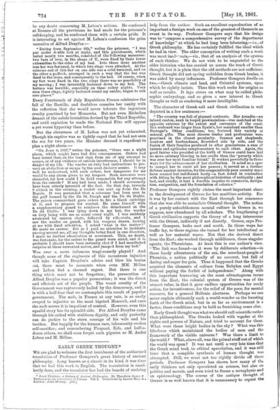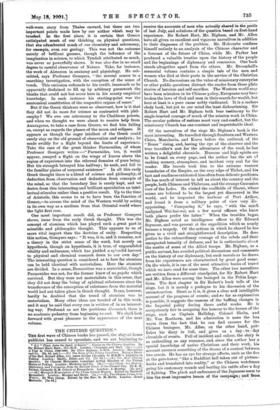EARLY GREEK THOUGHT.* WE are glad to welcome the first
instalment of the authorised translation of Professor Gomperz's great history of ancient philosophy. Long known as a classic in its kind, it was time that we had this work in English. The translation is excel- lently done, and the translator has had the benefit of untiring
• Greek Thinker., a History of Ancient Philoasahy. By Theodore Gonip r . . Professor at the University of Vienna. VoL I. uslated by Laurie Mai,Lu • London : John Murray. [ble.]
help from the author. Such an excellent reproduction of so important a foreign work on one of the greatest of themes is an event in its way. Professor Gomperz says that his design was to "compose a comprehensive survey of the department of knowledge" at which he had long been labouring,—i.e., of Greek philosophy. He has certainly fulfilled the ideal which he had in view. The older conception of writing such a work was most inadP-mate,—viz., that of an analysis of the system of each thinker. We do not wish to be ungrateful to the older historian who has carried us across the track of Greek thought, but it is plain that the old methods are not sufficient.
Greek thought did not spring unbidden from Greek brains, it was aided by many influences. Professor Gomperz dwells on two,—Greek climate and land, and Oriental systems, upon which he rightly insists. Thus this work seeks for origins as well as results. It lays stress on what may be called philo- sophic embryology, and so gives a new interest to Greek thought as well as rendering it more intelligible.
The character of Greek soil and Greek civilisation is well depicted in a few sentences :—
"The country was full of piquant contrasts. Her Arcadia—an inland canton, sunk in torpid provincialism—was matched at the opposite extreme by the extent and curvature of the coast. Her seaboard was larger than Spain's, her mainland smaller than Portugal's. Other conditions, too, fostered this variety oi natural gifts. The most diverse trades and professions were practised in the closest proximity. Seamen and shepherds, hunters and husbandmen, flourished side by side, and the fusion of their families produced in after generations a sum of talents and aptitudes complementary to each other. Again, the good fairies who presided at the birth of Greece could have laid no more salutary blessing in her cradle than the 'poverty which was ever her most familiar friend.' It worked powerfully in three ways for the advancement of her civilisation. It acted as a spur to compel her to exert all her powers ; it served as a further defence against invasion, for the comparatively poor country must have seemed but indifferent booty-41 fact noted in connection with Attica by the most philosophical historian of antiquity ; and last, and chiefly, it lent a forcible impulse to commerce, naviga- tion, emigration, and the foundation of colonies."
Professor Gomperz rightly claims the most important share in the development of Greece for her maritime activity. For it was by her contact with the East through her commerce that she was able to assimilate Oriental thought. The notion of a purely autochthonous mental culture in Greece is, we suppose, now abandoned by all scholars. The lengthening of Greek civilisation supports the theory of a long intercourse with the Orient, indirectly if not directly. Greece, says Pro- fessor Gomperz, looks east and south. In those ways her traffic lay, to those regions she turned for her intellectual as well as her material wares. Not that she derived direct from the East; she worked through middlemen, those singular agents, the Phoenicians. At least this is our author's view. "The link was found—as it were by deliberate selection—in those hardy adventurers of the sea, the merchant-people of Phcenicia, a nation politically of no account, but full of daring and eager for gain. Thus it happened that the Greeks acquired the elements of culture from Babylon and Egypt without paying the forfeit of independence." Along with this important borrowing on the most advantageous terms from the East, the colonial system of Greece was of the utmost value, in that it gave endless opportunities for ready action, for inventiveness, for the relief of the poor, for mental resource, for a general Hellenic alertness. Perhaps we can never explain ultimately such a world-wonder as the bursting forth of the Greek mind, but in so far as environment is a factor, these conditions may be held as furnishing some clue.
Early Greek thought was what we should call scientific rather than philosophical. The Greeks looked with wgnder at the sights and powers of Nature, and tried to account for them. What were those bright bodies in the sky ? What was this life-force which maintained the bodies of men and the framework of the visible universe ? Was there a limit to the world ? What, above all, was the primal stuff out of which the world was spun? It was not until a very late time that the Greek mind took to ethical speculation, and it was still
later that a complete synthesis of human thought was attempted. Still, we must not too rigidly divide off these periods. Professor Gomperz has shown how many of the early thinkers not only speculated on science, but also on politics and morals, and even tried to frame a metaphysic and an epistemology. The course of the antique thought of Greece is so well known that it is unnecessary to repeat the well-worn story from Tholes onward, but there are two important points made here by our author which may be touched. In the first place, it is certain that Greece anticipated much of our thinking on physical questions, that she adumbrated much of our chemistry and astronomy, for example, even our geology. This was not the outcome merely of brilliant guesses, though the influence of the imagination in science, to which Tyndall attributed so much, was never so powerfully shown. It was also due in no small degree to careful observance of Nature. Take, for instance, the work of Alcmceon in anatomy and physiology. He sub- mitted, says Professor Gomperz, "the several senses to a searching investigation, with the exception of the sense of touch. This omission redounds to his credit, inasmuch as he apparently disdained to fill up by arbitrary guesswork the blanks that could not but occur here in his scanty empirical knowledge. In each instance his starting-point was the anatomical constitution of the respective organs of sense."
But if the Greek thinkers were so observant, how is it that they did not do more for science as contrasted with phil- osophy? We owe our astronomy to the Chalchean priests, and when we thought we were about to receive help from A rmxagoras, to take a case from Greece, we find him failing us, except as regards the phases of the moon and eclipses. It appears as though the eager intellect of the Greek could rarely stay on the old ground of observation and analysis; he made swiftly for a flight beyond the limits of experience. Take the case of the great thinker Parmenides, of whom Professor Gomperz writes :—" Parmenides, too, it would appear, essayed a flight on the wings of Icarus above the region of experience into the ethereal domains of pure being. But his strength betrayed him halfway; he sank, and fell to the familiar plains of corporeal existence." In all this early Greek thought there is a blend of science and philosophy, of deduction from observation and deduction from concepts of the mind, so that the boundary line is rarely kept, and we derive from this interesting and brilliant speculation an intel- lectual stimulus rather than a positive result. Up to the time of Aristotle, this seems to us to have been the function of Greece,—to arouse the mind of the Western world by acting in its own way as a medium from that Oriental world where the light first rose.
One most important result did, as Professor Gomperz shows, issue from the early Greek thought. This was the concept of atomism which has played such a great part in scientific and philosophic thought. This appears to us of more vital import. than the doctrine of unity. Respecting this notion, Gromperz says : "It was, it is, and it remains, not a theory in the strict sense of the word, but merely an hypothesis, though an hypothesis, it is true, of unparalleled vitality and endurance, which has yielded a splendid harvest to physical and chemical research down to our own day." The interesting question is considered as to how far atomism can be held identical with materialism. Here the atomists are divided. In a sense, Democritus was a materialist, though Parmenides was not, for the former knew of no psyche which survived. But they were not materialists in this sense, that they did not deny the being of spiritual substances since the transference of the conception of substance from the material world had not taken place in Greek thought. It can, however, hardly be doubted that the trend of atomism was to materialism. Many other ideas are treated of in this work, and it may be said that every one is written of in an interest- ing way. Profound as are the problems discussed, there is no academic pedantry from beginning to end. We shall look forward with great pleasure to the appearance of the next volume.







































 Previous page
Previous page